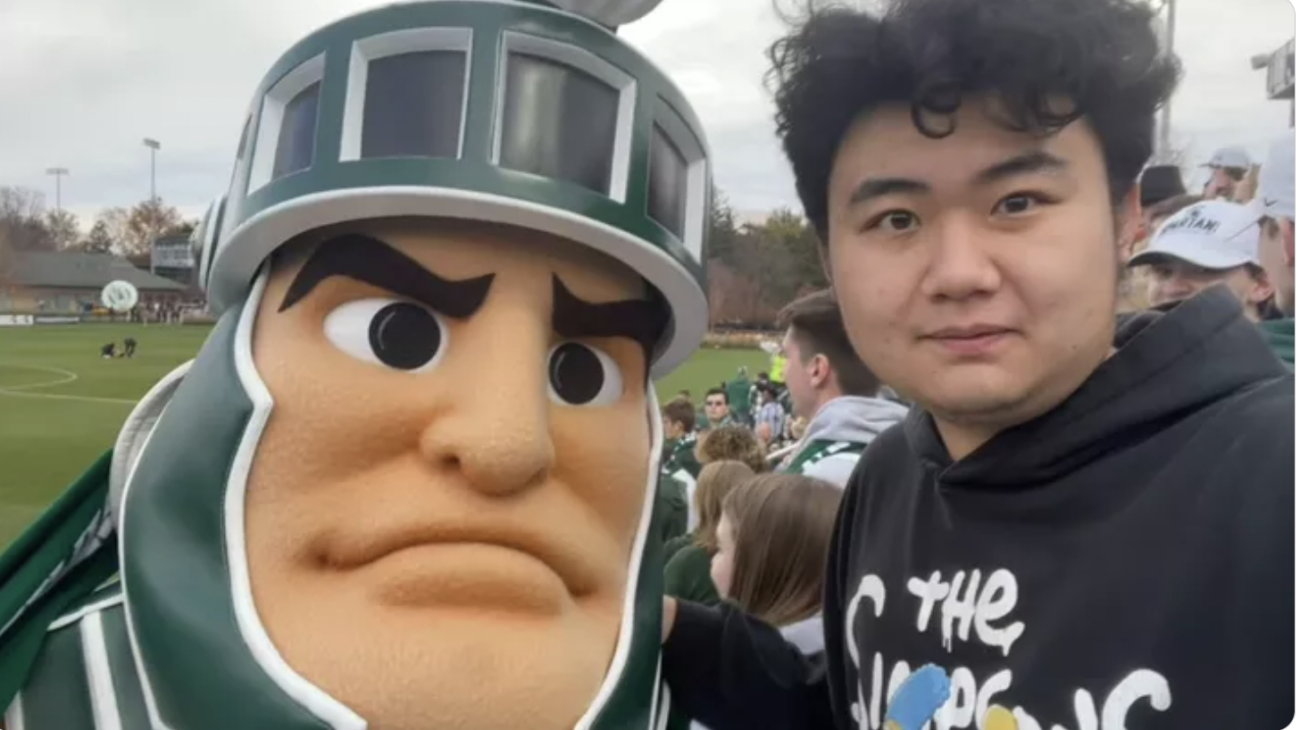Michigan State shooting survivor John Hao indicates he too will sue MSU

- A lawyer for student Yukai ‘John’ Hao filed an intent to sue MSU for critical injuries suffered in a February mass shooting
- The document alleges MSU acted with “gross negligence” in failing to adequately protect students
- Three of the five critically injured students have now indicated their intent to file suit
Yukai “John” Hao, one of five students critically injured in the Michigan State University mass shooting in February, intends to sue the university. He becomes the third injured student to signal a coming lawsuit.
William Azkoul, a lawyer for Hao, filed a notice of intention to file claim to the Michigan Court of Claims, which the court received earlier this month. The document is addressed to the court, the state attorney general and the university.
Related:
- Michigan State plans memorial for shooting victims as part of $2M in donations
- Two Michigan State shooting survivors plan to sue, citing MSU negligence
- Michigan State University expands ability to issue emergency alerts
Hao was among those critically injured in Berkey Hall on Feb. 13 after a gunman burst into a classroom that evening and began shooting, killing two and wounding the others. The gunman then left the building and headed toward the MSU Union, where he killed a third student.
At the time of the shooting, Hao was a junior studying sports management. Hao’s roommate previously told Bridge Michigan that Hao likes adventures and going on road trips. Hao attended a Philadelphia 76ers game in May as a special guest of star James Harden.
Two other critically injured students, Troy Forbush and Nate Statly, have signaled they intend to sue the university. The family of Alexandria Verner, one of the three students who was killed, filed legal papers that suggest that it too may sue.
In each of the legal filings, attorneys for the students raised concerns about university security and safety, both in preparing for the potential of a campus shooter and on the evening of the deadly attack.
In the notice, Hao’s attorney writes that the university and its departments “acted with gross negligence and failed to take reasonable steps to protect students and visitors on its campus from harm.”
He cited how the university allowed public access to buildings in the evening, did not employ security guards to monitor building access, failed to install locks on the inside of classroom doors and failed to use lock systems that allowed instructors to activate locks.
Additionally, he said, the university chose not to lock buildings that could be remotely locked, including the Union, and failed to provide university and local law enforcement with keys or access cards to university buildings that were remotely locked. Bridge previously reported that MSU officials had not publicly disclosed the timing of any lockdown measures that evening.
MSU deputy spokesperson Dan Olsen issued a statement Tuesday that mirrored a statement released last week.
“Many lives among our community have been profoundly impacted by the violence our campus experienced,” he said. “We are heartbroken and sorry for the tragic loss of life and each person harmed by senseless gun violence. MSU has been engaged in conversations with the families of those we lost and those injured to identify ways to provide ongoing support, and we are committed to keeping those lines of communication open.”
MSU announced in March it would install classroom locks that allow those inside classrooms to lock the doors in case of emergencies or attacks. The school also adjusted the hours in which someone could enter a university building without a key or keycard and said it would require Active Violent Intruder Training in the future. The university began installing these locks in late May.
Lawyers filing the legal notices in recent weeks also argued the university unjustifiably delayed sending out campus alerts that an attack was in progress.
As Bridge earlier reported, there was a delay of 12 to 13 minutes between the time the first frantic 911 calls came in about an active shooter and when police issued a campus-wide text message alert warning students and staff.
In that time, the shooter, who was not associated with the university, was able to travel from the classroom building to the student union, killing once more.
Public records suggest there was a miscommunication between a shift supervisor and a police cadet working at the front desk of campus police headquarters.
Hao has injuries to his spine, spinal cord and lungs which have resulted in permanent paralysis at and below the chest, according to the document. Additionally, he has experienced “fright, shock, humiliation, pain, suffering, emotional distress, embarrassment, disgrace, loss of self-esteem and a significant loss of enjoyment of life.”
Hao’s lawyer said Hao will incur continuing medical, mental health and other expenses, including medical care for thoracic spinal surgery or surgeries and his recovery in Shanghai, China, where Hao is from.
Michigan Education Watch
Michigan Education Watch is made possible by generous financial support from:
Subscribe to Michigan Education Watch
See what new members are saying about why they donated to Bridge Michigan:
- “In order for this information to be accurate and unbiased it must be underwritten by its readers, not by special interests.” - Larry S.
- “Not many other media sources report on the topics Bridge does.” - Susan B.
- “Your journalism is outstanding and rare these days.” - Mark S.
If you want to ensure the future of nonpartisan, nonprofit Michigan journalism, please become a member today. You, too, will be asked why you donated and maybe we'll feature your quote next time!





